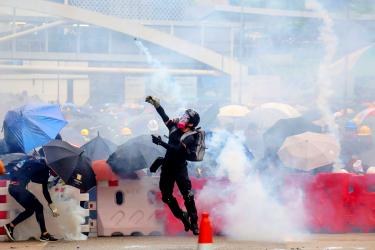Chaos engulfed Hong Kong’s financial heart yesterday as police fired tear gas and a water cannon at Molotov cocktail-throwing protesters, who defied a ban on rallying — and mounting threats from China — to take to the streets for a 13th straight weekend.
Police had banned the demonstration on security grounds and on Friday arrested several key advocates and legislators in a dragnet on pro-democracy figures.
However, yesterday afternoon, large crowds — many in their signature black T-shirts and under a colorful canopy of umbrellas — defied the order and snaked through Hong Kong Island, blocking roads and chanting “reclaim Hong Kong, revolution of our times.”
As evening fell, violence ricocheted through the commercial center of the territory, with a minority of hardcore protesters unleashing a barrage of Molotov cocktails and rocks at riot police.
Police fired a water cannon and rounds of tear gas to disperse protesters massed at a barricade in front of the Hong Kong Legislative Council, which was stormed in July during the early days of the protest movement.
They briefly broke through the barrier outside the building, but were repelled by tear gas and jets of blue-colored liquid fired from the water cannon.
Local media reported that the colored spray aimed to make it easier to identify suspects.
“Peaceful protest doesn’t work,” 22-year-old demonstrator Stone told reporters, giving one name. “I think they [the hardcore protesters] have to vent their anger to achieve something.”
As protesters streamed away, graffiti on a pillar inside a nearby metro station read: “We shall never surrender.”
Earlier, protesters marched by the official residence of embattled, Beijing-backed Hong Kong Chief Executive Carrie Lam (林鄭月娥), who is the focal point of anger after trying to pass a bill that would have allowed extradition to China.
Opposition to the extradition bill — now suspended, but not permanently withdrawn — has brought much of Hong Kong to the streets, with millions marching peacefully, but also groups of radical protesters clashing with police.
The protests have expanded into a wider pro-democracy call and a rejection of attempts by Beijing to curtail the freedoms of the semi-autonomous territory.
Protesters were in a defiant mood throughout yesterday, which marked the fifth anniversary of Beijing’s rejection of a call for universal suffrage for Hong Kong that sparked the 79-day “Umbrella movement” in 2014.
Many demonstrators were determined not to let the new movement fizzle out like the Umbrella protests did.
“It’s ‘now or never’ for Hong Kong,” said a 33-year-old accountant who gave her surname as Wong. “I’m a mother of two. They didn’t come today, but their grandmother did. We’re defending the right of assembly for the next generation in Hong Kong.”
At least five high-profile advocates and three lawmakers were arrested on Friday in a sweep aimed at defanging the rally.
Rights groups have said the tactics are cribbed directly from Beijing’s protest playbook.
Two of the Umbrella movement’s leaders, Joshua Wong (黃之鋒) and Agnes Chow (周庭), were among those arrested, charged and bailed for “inciting others to take part in unauthorized assembly.”
Police confirmed the arrests of the lawmakers, but denied the sweep was timed specifically to weaken the weekend’s protests.
More than 900 people have been arrested since June in connection to protests.
In an attempt to sidestep yesterday’s ban, crowds earlier carried Christian crosses and sang Hallelujah in religious gatherings — which do not require the same stringent permission from authorities.
The demonstrators, who have earned a reputation for their creativity and unpredictability, also called for “mass shopping trips” in the city center.
Source: Taipei Times - 2019/09/01





















